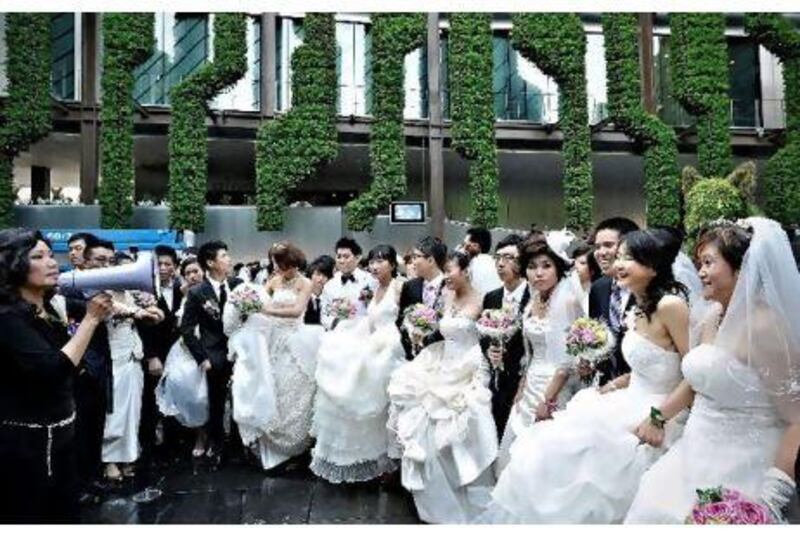BEIJING // Given that its emperors often had hundreds or even thousands of concubines and that it was legal for wealthy men to have several "second wives" until the end of the Qing dynasty in 1911, the Chinese might be expected to have a fairly laissez-faire attitude towards men who take more than one wife.
But the ruling Communist Party, which imprisoned people for extramarital affairs during Mao's time, is showing that it still has little sympathy with those who decide one wife is not enough.
Notoriously, four years ago, the head of China's national bureau of statistics was unceremoniously fired and expelled from the party after being found guilty of taking bribes and bigamy.
Branded by the party's central disciplinary commission as "a vile social and political influence" and as having "lived a decadent life", Qiu Xiaohua's spectacular fall from grace was a lesson to those who believed they could recreate the lavish lifestyles of previous millennia.
Now, the government has moved to prevent people from ever getting as far as marrying twice by setting up an online marriage database, allowing prospective brides who believe they are their partner's sole love interest to check whether they are merely a mistress.
The system is going live in Beijing, Shanghai and Shaanxi province this year, and is expected to cover all the country's 22 provinces and five autonomous regions and other areas by 2015.
The register, the vice-minister of civil affairs, Dou Yupei, told state media, will "act as a protective screen against illegal acts, such as bigamy and the concealment of marriage". Considering the ease with which one can get divorced in China and how common it has become for couples to untie the knot, it is surprising to some that bigamy has become an issue at all.
The communists introduced their first law allowing divorce in 1950 and three decades later made it possible for one member of the couple to secure a divorce despite the other's opposition. In 2003, a requirement to obtain permission from an employer and neighbourhood committee was scrapped.
The civil affairs ministry has said 2.47 million couples split in 2009, up almost nine per cent from the year before.
"The illegal marriage, the second time, it's rare, it's not very common right now," said Tian Chao, the manager of the Good Couple, Good Celebration, a shop catering to couples tucked away on the fifth floor of a modest building in the south of the Chinese capital.
"But this [register] should spread all over China. It's good to reduce illegal marriage."
Some have linked the apparent increase in infidelity to the country's improved economic fortunes. Despite the recent worldwide downturn, rapid economic growth has meant more men can embrace the very old tradition of keeping mistresses, or gui fei, so named for Yang Gui-fey, the favoured concubine of the Tang emperor Xuanzong.
While state media are filled with anecdotal cases with moral lessons, hard numbers of men keeping gui fei are difficult if not impossible to come by.
Still, the Communist Party views the problem as serious enough to have issued a strict new edict to its officials last year to not keep mistresses, after it was found that 95 per cent of those investigated for corruption were found to have them. The economic boom and a relaxation of residence rules has also led to more mobile lifestyles and more extramarital relationships, said Ting Kwokfai, who researches family and marriage in the sociology department of the Chinese University of Hong Kong.
In the past, when communities were more tightly knit, "pressure of your neighbours" would prevent extramarital relationships, he said.
"Because of society opening up so people can move around, that kind of social control is weakening," he said.
Certainly some Beijing residents believe the registry will be useful. Citing recent cases where bigamists used fake divorce certificates to marry a second time, the idea appealed to Li Qingxia, 22, a software engineering student.
"If you feel you don't know the other person well, this could be useful," she said.
Some others, perhaps with more romantic visions, seem less enthusiastic.
Li Xiaoxue, a 31-year-old farm manager who tied the knot late last year, said she wouldn't have checked on her then-fiance.
"Everyone has the right to know if the person they're marrying is single or not, but I trust the person I love," she said.
Wang Bazheng, a restaurant worker who, at 29, hopes to marry soon, agreed. "The couple getting married should know each other. I wouldn't check. I would trust her," he said.
With additional reporting by Associated Press






